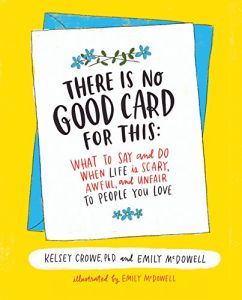Join getAbstract to access the summary!

Join getAbstract to access the summary!
Kelsey Crowe and Emily McDowell
There Is No Good Card for This
What to Say and Do When Life Is Scary, Awful, and Unfair to People You Love
HarperOne, 2017
What's inside?
Life just kicked your friend in the teeth. What do you say? What do you do?
Recommendation
Empathy experts Kelsey Crowe and Emily McDowell’s comforting, instructive manual gives you the tools to offer genuine, appropriate empathy to someone facing a crisis, be it a death in the family, a divorce, a job loss or some other trauma. Both authors are cancer survivors, and Crowe’s mother died young after battling mental illness. They’ve received awkward attempts at comfort and agree that these well-meaning efforts weren’t so terrible, after all. What hurt was the silence from people they thought would be there for them. Crowe and McDowell share their experiences on the giving and receiving ends of comfort, tell candid stories, provide concrete examples and offer frank, lively advice. getAbstract recommends their guidance to anyone who wants to help when it’s needed most.
Summary
About the Authors
Kelsey Crowe teaches social work at California State University. She founded Help Each Other Out. Its Empathy Bootcamps give people tools “for building relationships when it really counts.” Illustrator and speaker Emily McDowell created Empathy Cards for people undergoing a crisis.


















Comment on this summary